All Good Things Must End: Lessons from 18 Months on the Road with Tears on My Keyboard
Watch the video above first, then read my recap to find out all you’ve ever wanted to know about my trip! (If you’re looking for Alissa’s video, click here)
It’s been a long trip, so let’s start with the statistics. Here are the numbers I racked up over the last 18 months as well as all my best/worsts:
DAN’S TRAVEL STATS & FAVORITES:
Miles traveled: 105,759 (170,200 km’s) Countries (not counting layovers): 41 Cities: 124 Beds slept in: 174 Visitors to the website: 357,528 Favorite country: The Philippines Favorite cities: El Nido, Amsterdam, and Berlin Most surprising country: Sri Lanka Most surprising city: Berlin, Germany Favorite moment: Retracing my late grandfather’s steps from WWII in France and Germany Scariest moment: Witnessing a prisoner transport in Myanmar Happiest moment: Watching Alissa land a sandboarding jump in Namibia Most satisfying moment: Finishing our 12-hour volcano trek on Ambyrm Island Most inspiring moment: Seeing the work ethic of the nomadic women of the Tibetan Plateau Most exciting moment: Witnessing lions hunting and killing a Wildebeest Proudest moment: Singing the national anthem at the USA/Germany World Cup match Most fulfilling moment(s): Creating two pro bono websites for local tourism entrepreneurs trying to help their families. Links: 1 | 2
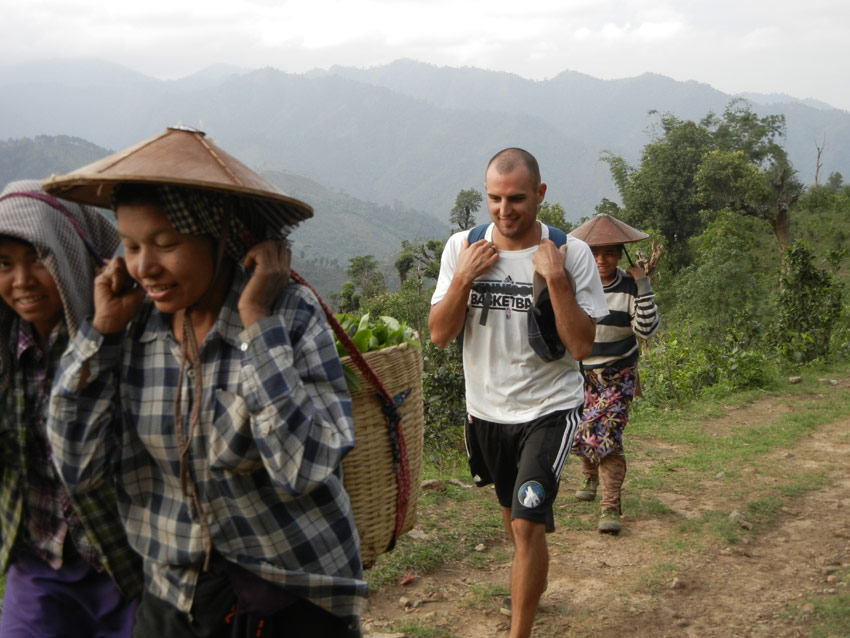
Getting caught in the afternoon rush-hour commute in the tea villages of Northern Myanmar.
FIVE LESSONS FROM THE ROAD
I get asked a lot about how this trip has changed me. It isn’t an easy question to answer, other than some of the obvious changes in my personal life and work life. In terms of my outlook on life, not a whole lot as changed, but I have however learned some valuable lessons. This won’t be a short post, but here are the lessons I learned from 18 straight months of living out of a suitcase:
1. Don’t confuse a love for travel with a love for vacations.
This is a tough one. It’s something that I know some might take the wrong way. But here’s the deal: Long-term traveling is extremely hard. Don’t ever let someone who isn’t a millionaire try and convince you that traveling for months at a time is easy. It requires a certain type of stress tolerance that many people don’t possess. I really struggled with this, and without Alissa there to help me along, I probably would have called it quits months before the trip ended. She had a much higher tolerance for stressful situations than I did, and it made us a pretty good team when things would go wrong.
A lot of people love vacations, but they hate traveling. I love vacations like nothing else. I get into “vacation mode” and I just have a blast every time. I spend more money than I should, I drink more than I should, I eat more than I should, etc, etc, etc. When this trip started, I immediately realized the type of traveling I was doing was not the type I loved. It doesn’t mean I was unhappy or didn’t like it, but it was a different way to see the world and I had to learn quickly to adapt. The point is this. Work is stressful, and depending on your job, it might be unbearable most days. Another way to look at this would be: Don’t confuse a love for travel with a hatred for your job or don’t confuse a desire for change with a fear of familiarity. Very few people can say they love their jobs, but make no mistake, even fewer can say they love long-term travel. Many people think they will love it, but if they really were faced with the realities of it, they would hate it. Being away from family and friends, constantly moving, always on guard of being scammed, constant uncomfortable situations, the list goes on and on.
Don’t get me wrong, there are GREAT moments that come from a life like this, but it is not something most people would love. I can tell you right now that I thought I would love long-term travel. I didn’t. I liked it, but in no way did I ever love it. Would I do it again in a heartbeat? Yes, but that doesn’t mean I loved it the whole time.
If you are thinking of doing something similar, make sure you really take a look at yourself and your travel mate and make sure that it really is something you want to do. One thing to note is that I still enjoy the off-the-beaten path travel style, and that isn’t something that has changed. I still prefer to land on a random island in a little plane with no hotel booked over flying to Cancun on an all-inclusive package.
2. Loving a destination takes weeks, months, even years.
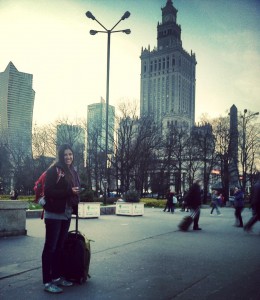
Alissa smiling in Warsaw even though we had no idea where our hotel was yet. We ended up loving this city!
I think one of the hardest parts of this trip was the letdowns. Getting to a city that we had heard so many great things about only to have an exhausting, underwhelming two days of site-seeing and walking around. There are very few cities on earth that you can fall in love with immediately. This is because getting to a city, especially big cities, is an incredibly stressful experience. Everyone dreams of just showing up magically in Paris or Rome, as if you were just transported Star Trek style. However, in reality, flying into an airport and then taking a 45 minute taxi, train, or bus to your budget hotel is not the most exciting way to introduce yourself to a new city. Reality checks are everywhere, and if you’re not careful, the stress of figuring out one of these cities will cloud your judgement of its beauty, its people, and its culture.
This is something I finally realized about halfway through our trip. To fall in love with a destination requires getting to know your way around, knowing some locals, knowing the culture, knowing the food, and knowing some of the city’s secrets. Only then can you actually fall in love with somewhere. Too many times we spent two or three nights in a city only to leave disappointed. However, every city has something great about it, and only spending a good amount of time there can allow for full appreciation of each city’s beauty. This is why we are constantly hearing this argument while traveling.
Person A: Have you been to XXXXXX city?
Person B: Yeah. I hated it.
Person A: WHAT?!?!?! (head almost explodes). I LOVVVVE XXXXXX city!
Person B: Well I got lost like five times and a guy stole my GoPro stick.
Person A: OMG, I got sooooo drunk there, it wasn’t even funny. Laaaahuv that place.
Every city is loved by somebody and all you need to do is find someone who is passionate about their own city and learn from them where to go and what to do. Don’t listen to anybody’s impression of a place who hasn’t spent AT LEAST a week there, preferably longer. Some of the best experiences we’ve had have come from recommendations of expats or long term travelers who have really spent time in a city and really know it. We refuse to take any advice from people who haven’t really got to know a city and it has helped us find some amazing places.
3. 99.99% of all people are good people.
This is something that I sort of believed already before I left for this trip, but something that I now believe with a passion. Yes, every country has a few bad apples. However, something that I actually feel now is even the people who might be out to scam you, steal from you, argue with you, etc, they are all STILL good people deep down. We have no idea what they have been through in life that has brought them to this point in time where they are now desperate enough to steal. Some of the most incredible conversations I had on this trip was when I realized someone was trying to scam us and instead of getting angry, I got friendly. I started asking about who they were and what they did everyday to feed their family. I think my favorite conversation of the entire trip was with a t-shirt salesman on the beach in Malawi. Here’s a guy who hears “No Thank You” “Get away” “Go away” “Leave me alone” all day, every day. Finding out how much impact just one shirt sale per day made on his family’s well-being was one of the most fascinating things I learned on the trip.
Next time you are approached on vacation by a “pesky local salesperson”, just think about what you would do in a situation where your family desperately needed money and how you would want to be treated in the same situation. It doesn’t mean you should buy something from everyone who asks, but it does mean you should treat everyone in that situation with respect and dignity.
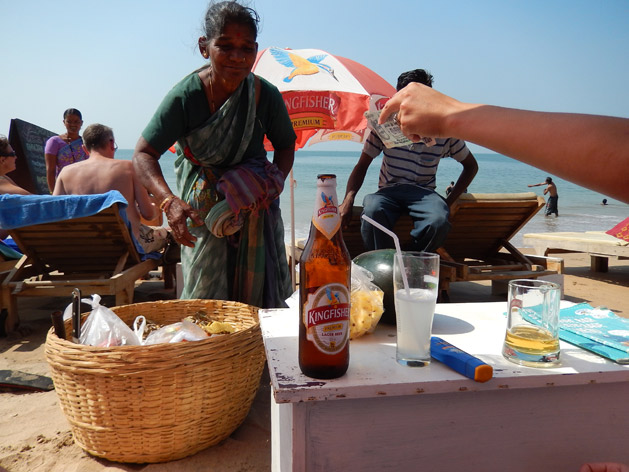
Buying a fresh pineapple from a 60+ year-old woman on the beach in India. She walks the beach with a basket of pineapples on her head for 8-10 hours a day to provide for her family.
It is easy to walk around a foreign country with your guard up and letting all the locals know that you are just being careful. It’s also easy to do the opposite and just walk around careless and trusting of everyone. I don’t recommend either. What I recommend is doing your homework before heading to a destination, but once you get there, embrace everyone and be open to everything that comes your way. There was never one time on the road where we needed some sort of help and weren’t able to find someone willing to help. That brings me to number four:
4. Those with the least to give are also those most-willing to give.
This was where I received the most inspiration throughout the trip. I know this is a generalization, and probably not fair to the majority of rich people who do give back. However, the fact is that there was a clear pattern on this trip where the people with the least amount of material wealth were also the ones most willing to give. The most willing to open their homes, the most willing to share their food, the most willing to go out of their way for others, the most willing to give us gifts, etc. The photo below is a dinner we were invited to while in Myanmar. A local man named Tun invited us to dinner in his one-room home which he shared with his elderly mother, four sisters, two brothers-in-law, and four little children. Not only did they cook us an amazing dinner, but they presented us with small gifts at the end of the night. It was just one of many examples of having those less fortunate helping us along our journey.
When I say the least material wealth, I’m not talking about homeless people, or people without jobs, or people who don’t live busy lives. I am talking about those who work their butts off just to make ends meet, yet still go above and beyond to help or assist anyone they see in need. I am not a psychologist, but it just seems like maybe these types of people are just able to emphasize more when they see someone in need. We would walk down the streets of Cambodia and watch a Range Rover drive right by homeless children without a second glance, while at the same time watching a nearby poor person walk over and give them some extra food. It was the same in India, China, and other countries with a high population of people living in poverty. I don’t think this phenomenon has a border, and it is even prevalent here in the United States. Those who have one time been at the bottom themselves are always the first to try and help others. It was an eye-opener for my own life and has changed my outlook on what it really means to give back.
5. The desire to be healthy is much different then actually being healthy
I think one of the worst misconceptions on the planet is that every overweight person is unhealthy. There are plenty of overweight people who are extremely healthy and vice versa, plenty of skinnier people who aren’t healthy. Before leaving on this trip, I just WANTED to be healthy. I was blessed with a good metabolism that allowed me to cheat on healthy eating and living. However, I was not actually healthy. I was one of the skinny unhealthy people. I had two surgeries before leaving on the trip to fix an issue that I believe I developed simply from sitting too much. Within months of the trip, the health issue had nearly disappeared, and now it no longer exists.
So what happened? Traveling made me naturally move around more. I walked more in the last 18 months than I probably have the last 18 years. It wasn’t because I wanted to walk, it was because I had to. In the places we traveled, we rarely had any type of motor transportation of our own. A typical day for me would include hauling my backpack up five flights of stairs, walking a couple of miles to town to site-see, followed by a two mile walk to the market for lunch, followed by another couple of miles walk home. A regret of mine is that I didn’t wear a pedometer for the duration of the trip!
The walking method of transit is so much more common in other parts of the world. Humans weren’t meant to be shuttled around by vehicles all day, and when you see how billions of others get by without driving everywhere, it really makes you reconsider your travel habits. I still need a car for work and will most likely always own some sort of vehicle. However, the days of driving somewhere less than a mile away because I’m too lazy to walk are nearly over. I now own a bike, I now walk longer distances to get places, I now rarely take an elevator or escalator. In my opinion, just walking is the number one way to stay healthy and lose weight.
One of the biggest differences I saw in developed countries vs. developing countries: In developed countries, the less-fortunate people tend to be the overweight people, whereas in developing countries, the rich people tend to be the overweight people. The reasons for that are debatable and endless.
WHAT NOW?
This part may seem like the most important part of this article, and it is. Yet it’s at the bottom of the article. I did that for a reason. There is research out there that shows that only a small percentage of blog readers actually read entire articles. The majority read the first paragraph, maybe two, then move on to something else. Only our family, friends, and loyal blog readers will make it to this paragraph. Those are the people who I want to know what has happened recently in our lives and where each of us are now.
Tears on my keyboard
It’s bittersweet that I am writing this article on while I’m on the train between Chicago and Milwaukee. It’s the same train Alissa and I took on our very first trip together back in 2007. Now here I am writing about what turned out to be the very last trip we will ever take together. That is because Alissa and I have decided to go our separate ways permanently and have filed for divorce. Although I write a travel blog all about my life, I still consider myself to be a private person, so if I leave out specific details in this article please know that I am doing that for the privacy of both Alissa and myself.
This divorce wasn’t a mutual decision, and one that came from Alissa realizing she could no longer be happy in a relationship with me. I mentioned above that I believe 99.99% of people in this world are good. I would consider both Alissa and I to be in that group of 99.99%. However, earlier this year, we met a person who I can best classify as one of the 00.01% types. This person infiltrated our relationship and caused significant damage that could not be undone. It finally reached the point where the only way for both Alissa and I to ever be happy again would be for us to be apart from each other forever.
This whole experience has been very heart-breaking for me. It has been a roller-coaster of emotions, but mostly sadness. I have no regrets about any of it (marrying Alissa, taking the trip, or the divorce). The trip itself isn’t what caused the separation, in fact, I look at the experiences I had on trip as now helping me move on faster. If someone would have told me two years ago that I only had 18-months left with the woman I love and that I could do anything I wanted for the next 18 months, I would have done exactly what we just did. I would have bought two one-way tickets and traveled the world. The bottom line is Alissa was headed down a path that would have eventually led to her leaving, which means to have it happen sooner than later is a blessing.
What the future holds for us
Last month I decided to move back to Minneapolis, and I am now renting a condo downtown (the condo I own is still being rented until next year). Any concern about the ability to find employment after an 18-month career break ended after I received a couple of job offers this week. Each offer is a better job than the job I left behind 18 months ago. Not a bad career path: Job -> quit job -> travel -> better job. I do plan on keeping this blog for my own travels, but I will not be posting much anymore. I do have a couple of “How to make money while traveling” type articles that I will probably publish in the next couple of weeks, as well as an article about my experience tracing my grandfather’s WWII path in Europe.
Alissa will soon be traveling across the world to follow her heart. She then plans on coming back(at least temporarily) to Minneapolis to restart her own career as a user-experience designer. She will no longer be apart of this blog with me as a writer or contributor and I will no longer be posting any updates here about her life or travels. Going forward, the best way to contact Alissa will be through her personal Facebook and LinkedIn profiles.
FINAL WORDS
This trip truly was a life changer in more ways than I could ever have imagined. The amount of support that we received before, during, and after the trip was utterly amazing. Since our separation a few months ago, I have really become so appreciative of all the support people have given both myself as well as Alissa. What is interesting about when you lose the person closest to you is that it brings you much closer to everyone else in your life, at least temporarily. It is one of a few bright spots that has come out of this situation for me. To everyone who’s been there to talk or to listen during all of this, I will never be able to thank you enough.
As for all the 300,000 people who came and read all of our crazy stories each week over the past 18 months, Alissa and I, from the bottoms of our hearts, we:

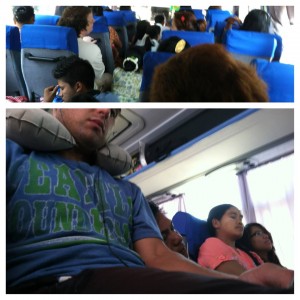
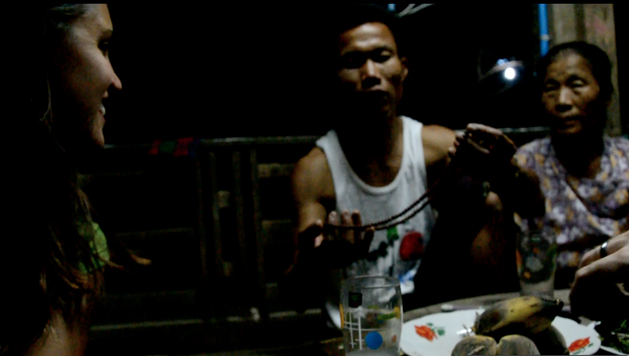
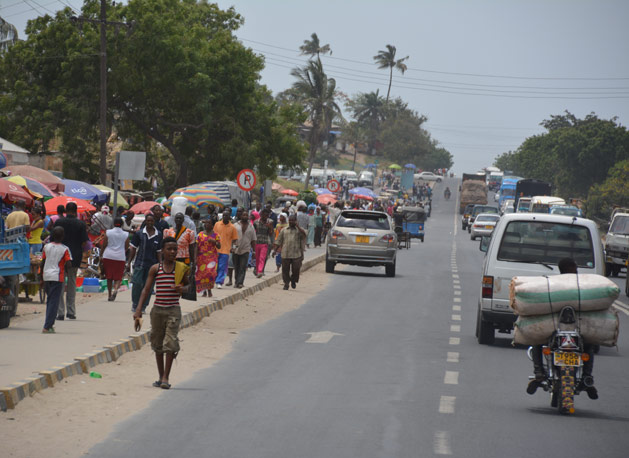

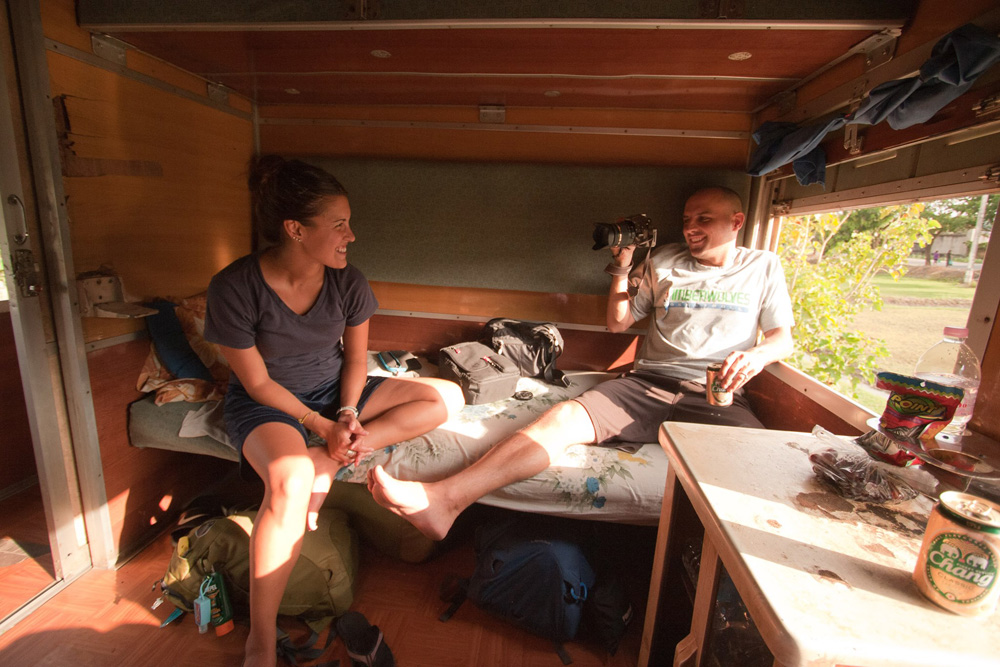


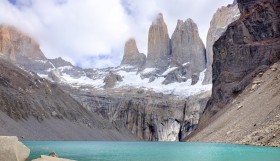
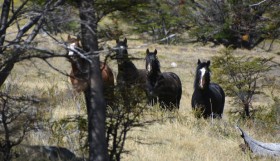















20 Responses to All Good Things Must End: Lessons from 18 Months on the Road with Tears on My Keyboard